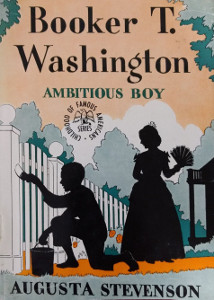Booker T. Washington: Ambitious Boy

Author:
Augusta Stevenson
Illustrator:
Charles V. John
Publication:
1950 by Bobbs-Merrill Company
Genre:
Biography, Non-fiction
Series:
Childhood of Famous Americans (Social and Civic Leaders)
Series Number: 12
Pages:
197
Current state:
This book has been evaluated and information added. It has not been read and content considerations may not be complete.
Book Guide
Search for this book used on:
There was a new fly-boy in the big house on the Burroughs plantation. Three times a day—at breakfast, dinner and supper—he sat on a high stool in the corner of the dining room. He pulled the cord that worked the "contraption" that fluttered the papers that kept flies away from the table. The new fly-boy was just eight years old, and his name was Booker.
He had always lived on this Virginia plantation. His mother was the Burroughs family's Negro cook. Booker had many chores: he helped feed the pigs and chickens and hoe the garden; he went after stray cows that wandered into the woods. But fly-boy was his important job. He had to watch for only two things: he mustn't get drowsy and he mustn't laugh, no matter how many funny tricks young Master Tom might think of. And Booker wanted to do his work as well as possible.
The War between the states was coming closer to the plantation, and there was less fun and more hardship now for everyone. In Booker's cabin the sweet-potato hole was nearly empty. They had molasses only once a week. There were no more cotton shirts for the boys; they had to wear stiff, scratchy tow.
Booker, his brother and his little sister often talked of what they would do after the war. Most of all Booker wanted to go to school.
Then, suddenly, the war was over. All the slaves were free. Booker's family had left the plantation. And in the coal mines of Malden, West Virginia, there was a new miner. Every morning he fastened a tiny oil lamp to his cap and went into the dark mine. He helped dig coal and load it into mule carts. He had to watch for falling slate, for the dangers of gas. When the day was over he scrubbed off the coal dust and ran all the way to a night school. The new miner was eleven years old, and his name was now Booker T. Washington.
In West Virginia money was scarce and Booker had to work hard, long hours. But he was free—to take a name, to earn money and save it when he chose, to work for what he wanted. Booker's ambition now was to go to college, and he didn't mind any sort of work that would help him get there.
Years later there was an exposition in Atlanta, Georgia, at which many prominent men made speeches. But the greatest applause came when the president of Tuskegee Institute spoke. This distinguished educator talked of the friendship of races, of the education, aims and future of his Negro people. He was the founder of a fine school—Professor Booker T. Washington, who had come up from slavery to be a leader of his race.
His boyhood story is Augusta Stevenson's fifteenth book for the Childhood of Famous Americans series. Each new Stevenson book is hailed with delight by her wide audience. Children know it will be by turns exciting, amusing and inspiring. Her story of the ambitious negro boy demonstrates again her remarkable gift for telling a story children will enjoy and remember, for bringing out the real character of a famous American.
From the dust jacket
To view an example page please sign in.


